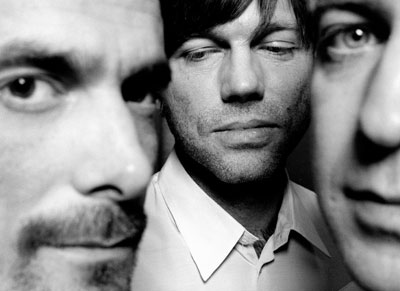The
story of Camouflage is the perfect Hollywood rags to riches tale - it
goes from nothing to top twenty hits and international fame in the blink
of an eye. But like any success story, there is a price to be paid, a
price so high that it nearly destroyed the band and gave the story a sad
ending.
Now hear the story, from the mouths of three wizened wonder boys. Once
upon a time, in a small city called Bietigheim-Bissingen…
A
new beginning
In the 2003 movie ”Verschwende deine Jugend”, we are transported
back to Germany 1981, where the 19-year old bank trainee Harry makes a
pilgrimage to the big city to watch DAF perform. Afterwards he buys a
cheap toy synthesizer, pushes the keys and marvels at the sounds they
make on the train home.
- At that time we were taking dancing lessons, recalls Heiko Maile. It
was standard dancing like waltz. It’s kind of embarrassing, but,
you know, until the end of the eighties it was still common to take theses
dancing lessons at the age of 15 or so. We didn’t grow up in big
town, so it was the first the first contact with dancing for us. You met
girls. It was just for fun.
In the same building where Heiko, as well as Oliver Kreyssig and Marcus
Meyn - later the singer of the band - took their first nervous dance steps,
a club was held in the weekends.
- And at this club, Heiko goes on, the DJ:s played the greatest music
of this time. They were music collectors; they bought records as imports
from Canada and all over the world, to play the latest shit there. So,
this was really the time when we got real contact with the new music from
around the world.
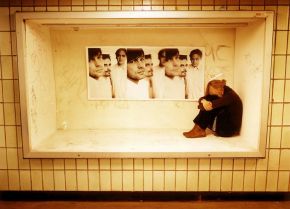
From
AC/DC to The Human League
Heiko had taken classical guitar lessons as a child and mostly listened
to AC/DC. The experience of hearing ”New Life” by Depeche
Mode and songs by The Human League and DAF on the same club night was
a wondrous revelation, forever changing the direction of his life as well
as the trio’s. In the following years, long hours were spent toiling
in factories during school holidays, all to earn money for synthesizers
to form the only group in Bietigheim with their own band T-shirts. Heiko:
- You mention DAF. I was a big fan of their music. I think Oliver and
I, we walked down by the river somewhere in our hometown and I said to
him: “What they can do, at least we could do the same or something
similar. We just need a drumbox and one synthesizer.” And that was
the equipment we started with.
If dancing was unfamiliar to the young trio, so was playing any musical
instruments, excluding only Heiko's rudimentary guitar skills.
- We never learned to play any instruments, says Marcus Meyn. I never
learned playing keyboards, none of us did. We had a fourth member in the
beginning that was a professional though; he learned playing the piano.
But he was the only on who could do it, like this (shows ten fingers).
We others just did it by trial and error, you know, with three fingers.
- That guy wasn’t really interested. He wanted to hang out with
friends and things like that; not sit in a studio programming. We’re
still good friends, though. He’s a lawyer. He’s my lawyer,
Heiko says.
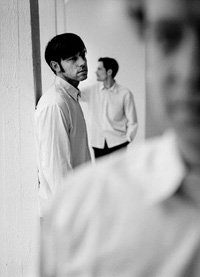
The
new punk
The synthesizer was making way for the new punk. There is no other way
of putting it. If punk was concerned with three simple chords and three
simple people with no musical background, the new wave of synthesizer
music was the same, minus guitars and even drummers. It was just as radical
a change as punk used to be, and it met with as many prejudices.
- We were the only ones doing this in our area, the Stuttgart area, at
the time. When we told people we were making music without guitars, they
couldn’t believe it. It can’t be serious, they said, it’s
not rock music. And you have to see this dimension, how this kind of music
was perceived back then. No feeling, no art, nothing. Cold electronics.
But unlike many bands fascinated with the mechanised, inhuman qualities
of electronic music, Camouflage were always striving for a warm, passionate
sound. The Depeche Mode influences constantly and clearly audible on Camouflage
tracks aren’t there by accident - Camouflage, like Depeche Mode,
always put songwriting first. Only when a strong melodic frame has been
established, is there room for experimenting. Camouflage even claim to
enjoy Kraftwerk, the band mainly responsible for the public view that
electronic music is cold and machine-like, for their warmth.
- Everyone loved Kraftwerk back then of course, says Marcus. We all know
about ”The Robots” and so on, but I think at the time when
we started listening to electronic music, for us it was ”Computer
Liebe” - “Computer Love”. The other stuff was interesting
too, but on that album, ”Computer World”, you have a really
warm, melodic, harmonic sound, and that was a very big influence on us.
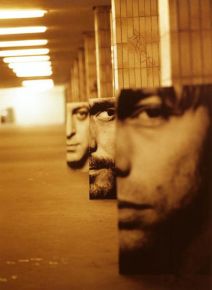
Alphaville
and Boytronic
Around Stuttgart, Camouflage may have been the first group making this
particular type of synthesizer pop music. But unknown to them at the time;
they were not alone in Germany.
- I remember the first time we heard about Alphaville, Heiko laughs. We
had just played our first or second concert, and suddenly we realized
that there is a band on a TV-show called Alphaville and we just couldn’t
believe it ‘cause we were so naive - we thougth we were the only
ones doing music like that. I think we even spoke about how it was ”senseless
to go further now” because there is already a band like that. And
of course there was Boytronic as well, who already had a big hit one year
before our first single came out.
To start with, Oliver was the chief of promotion in the band, diligently
sending demos to addresses he had found in music magazines. He also sent
a package to a legendary radio show over in another part of Germany called
”Songs from Synthesizer”. One day someone finally called him,
at his parents place, saying the magic words: ”I heard your song
on the radio, and there is a record company who’s interested in
you”. Oliver Kreyssig is not likely to forget this.
- I couldn’t believe it. But I called Heiko immediately. That was
a small label called West Side, they invited us over, and a few weeks
later, we met. We played our demo, and they gave us a contract.
- I think they thought we were quite professional, says Heiko, because
we were really calm, and we didn’t say that much. But the moment
they left the room we were like YES! YES! And when they came back in it
was like, hrmm, we were totally serious again!
- It was a lot of fun, Marcus says, ’cause we had a song called
”Suddenly Went Away” that later would become ”The Great
Commandment”. During the meeting with the record company I don’t
know how many times we played the song to them, just in the backgroud,
saying something like, yeah, um, I think this could be a good single...
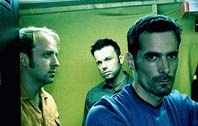
It’s
all about the first single
”The Great Commandment” would change everything. From practically
nowhere, Camouflage crashed headfirst into the German charts in 1987,
and remained there by delivering a string of hit singles including ”Stranger’s
Thoughts” (1988) and ”Love Is a Shield” (1989). Thanks
to the efforts of American college radio, international recognition soon
followed, and the success was perhaps too quick and too massive for a
couple of naive young men from a small town. In workaholic tempo, two
albums, ”Voices and Images”(1988) and ”Methods of Silence”(1989)
were produced and the pressure on the group grew in force and became constraining.
After the second album, Oliver Kreyssig simply had it with Camouflage.
He bailed out. Suddenly went away.
- It wasn’t easy, explains Oliver. The band changed. We changed.
The success came very fast. We were together all the time, in the studio.
Together 16 hours a day, doing promos and things like that. There were
little problems and they grew bigger and bigger. So, one day the consequence
of it all was to say OK, that’s it.
The bubble of success gradually deflated in Oliver’s absence. Heiko
Maile and Marcus Meyn recorded three albums on their own, but public interest
had faded and the record company no longer even bothered with releasing
their albums abroad. The success and what it brought had somehow drained
the band. Something was missing, Heiko thought.
- It sounds a bit romantic, but we really used to sit in the studio and
say: “Oli” would love this song, or “Oli” would
really like this. And we still met him now and then. To be honest, it
was not easy for us to be selling less and less records. I mean, you are
still working full time with the project. And at the end, you have to
realise that you can’t spend years in the studio and get no money
out of it. So, we had to react and sort out what we could do.
From
musicians to record label people
After the last album as a duo, ”Spice Crackers” (1995), was
finished, Camouflage took a break. Marcus moved away from Hamburg where
they both were living, and for two years, he and Heiko scarcely met. Like
Oliver, Marcus worked at a record company, while Heiko kept himself busy
writing music for advertisements.
- After a while we decided that we needed to talk about the future of
the band, Marcus says. Eventually, the decision was to try it all over
again, but only on the condition that the basis would be the same as when
we started the band. It would have to be about friendship, fun and music.
This was really a kind of new start for us. And one part of this new start
was to ask “Oli” to come back to the band.
The new start brought many changes. As record company people, both Oliver
and Marcus had gathered enough experience of the music industry not to
accept any bullshit when it came to the business side of the band. Creatively,
the focus was changed from Heiko as the creative center to a more democratic
working order with three songwriters.
In light of these reforms, hopes were high for their next musical love
child, named ”Sensor” long before they made the album or even
found a record company for it. But the birth of ”Sensor” would
prove long and painful.
The idea was to use three separate production teams for the album. Considerable
sums of money were paid to enlist the aid of well-known Brits Rob Kirwan
and the production team TOY, with German producer Humate as the third
part. To solve the problem of geographic distance, a web site was set
up where new versions of the tracks could be uploaded and heard by everyone
involved. The idea was grand, and in retrospect, it seems foolhardy, but
nonetheless work commenced.
Kirwan proved to be a charming fellow. And musically completely unsuitable
for Camouflage. Then under mystical circumstances TOY, who worked on Depeche
Mode’s ”Ultra” and must have been high on Camouflage’s
wish list, suddenly jumped the ship. Heiko seems almost pained by the
subject.
- We had really fought for them. We had a good start. It’s hard
for a German record company to pay a British producer; the prices are
triple to those in Germany. But we said OK, we won’t use any material
produced by them.
In the end, all the work was done with Humate in Hamburg, and with the
pre-production fiasco included, it took about a year.
- The funny thing is that we thought the three teams would be a great
way to get a record made in less time, says Marcus. And at the end of
the day, it took us one year, and a lot of stress, a lot of discussions
and a lot of money for the record company. They don’t forget to
remind us how much money they spent on the project.
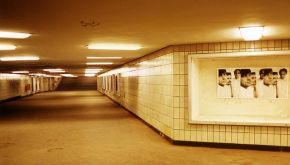
One
step back, two steps forward?
When ”Sensor” finally saw the light of day, some of the songs
were several years old and had been played live, leading to speculation
among some fans that ”Sensor” had been finished for a long
time but that the band has been forced to wait four years to release it.
But the actual production only started in 2002. Before that, Camouflage
used the name ”Sensor” in various contexts, such as to name
concerts, for no other reason than to keep their focus and put pressure
on themselves to actully complete the ambition to record the album.
- The name ”Sensor” is about the music we are making, says
Oliver, which is electronic music and the kind of songs and lyrics, the
atmosphere. You have electronic music and a kind of sensual or sensitive
theme, so we thought this is perfect, and it sounds good and international.
Since we used the name for so long, we already had a kind of feel, or
atmosphere of ”Sensor” before making the album.
The warm atmospheres and strong choruses of the finished album hearken
back to a younger Camouflage and a younger synthpop scene, as if the band
were reaching back, searching for the secret of their past success. ”Sensor”
undeniably contains a couple of strong, if not original (the Depeche Mode
influences on the album occasionally border on song theft) singles, especially
”Me and You” and ”I Can’t Feel You”. Can
these songs pull Camouflage out of obscurity once more? Nothing is certain.
And Camouflage, apprehensive after all the hardship, are a lot more humble
today.
- We started in Germany with a top 20 single, Marcus remembers. Suddenly
you had lot of people around you. Management, tour management. Big companies,
and they organised everything for you. We didn’t recognise that
much how it works. And now we have learned a lot and see things differently.
Now we haven’t got a top 20 single and we have to work from this
position. But we know that people are still interested to see us live,
in Sweden or in America. And now we are playing in Sweden because we are
releasing our record in Sweden. With our old management, we would never
have gone here without major record sales in advance.
- In a way, how we are now is a mixture of almost the same spirit as we
had at the beginning and the knowledge we have from all these years, Heiko
summarises. On one hand, we are open-minded like 20 years ago, on the
other hand, we know exactly what's going on. |
|
|
